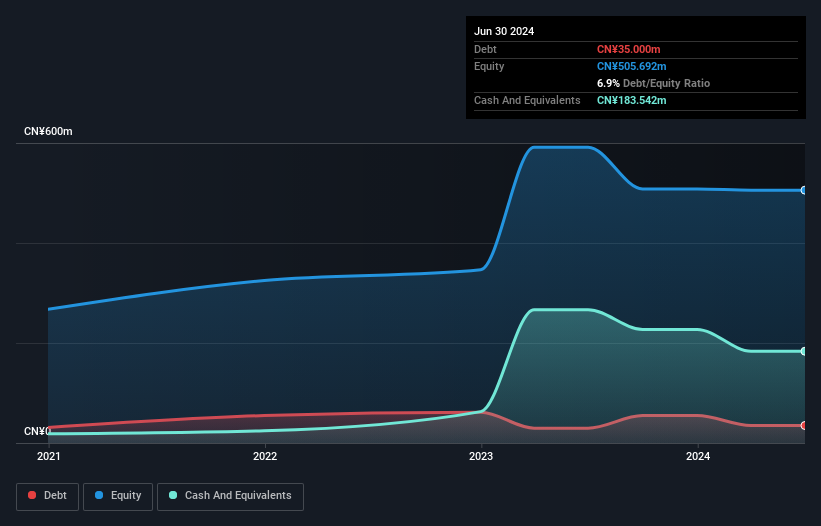
Howard Marks put it nicely when he said that, rather than worrying about share price volatility, 'The possibility of permanent loss is the risk I worry about... and every practical investor I know worries about.' So it seems the smart money knows that debt - which is usually involved in bankruptcies - is a very important factor, when you assess how risky a company is. We can see that Plus Group Holdings Inc. (HKG:2486) does use debt in its business. But is this debt a concern to shareholders?
When Is Debt Dangerous?
Generally speaking, debt only becomes a real problem when a company can't easily pay it off, either by raising capital or with its own cash flow. Part and parcel of capitalism is the process of 'creative destruction' where failed businesses are mercilessly liquidated by their bankers. However, a more frequent (but still costly) occurrence is where a company must issue shares at bargain-basement prices, permanently diluting shareholders, just to shore up its balance sheet. Of course, plenty of companies use debt to fund growth, without any negative consequences. The first thing to do when considering how much debt a business uses is to look at its cash and debt together.
View our latest analysis for Plus Group Holdings
What Is Plus Group Holdings's Net Debt?
The image below, which you can click on for greater detail, shows that at June 2024 Plus Group Holdings had debt of CN¥35.0m, up from CN¥29.8m in one year. But it also has CN¥183.5m in cash to offset that, meaning it has CN¥148.5m net cash.

How Strong Is Plus Group Holdings' Balance Sheet?
According to the last reported balance sheet, Plus Group Holdings had liabilities of CN¥196.2m due within 12 months, and liabilities of CN¥2.06m due beyond 12 months. Offsetting these obligations, it had cash of CN¥183.5m as well as receivables valued at CN¥443.1m due within 12 months. So it actually has CN¥428.4m more liquid assets than total liabilities.
This excess liquidity is a great indication that Plus Group Holdings' balance sheet is almost as strong as Fort Knox. On this view, lenders should feel as safe as the beloved of a black-belt karate master. Succinctly put, Plus Group Holdings boasts net cash, so it's fair to say it does not have a heavy debt load! When analysing debt levels, the balance sheet is the obvious place to start. But it is Plus Group Holdings's earnings that will influence how the balance sheet holds up in the future. So if you're keen to discover more about its earnings, it might be worth checking out this graph of its long term earnings trend.
Over 12 months, Plus Group Holdings made a loss at the EBIT level, and saw its revenue drop to CN¥646m, which is a fall of 16%. That's not what we would hope to see.
So How Risky Is Plus Group Holdings?
We have no doubt that loss making companies are, in general, riskier than profitable ones. And we do note that Plus Group Holdings had an earnings before interest and tax (EBIT) loss, over the last year. And over the same period it saw negative free cash outflow of CN¥57m and booked a CN¥17m accounting loss. With only CN¥148.5m on the balance sheet, it would appear that its going to need to raise capital again soon. Even though its balance sheet seems sufficiently liquid, debt always makes us a little nervous if a company doesn't produce free cash flow regularly. There's no doubt that we learn most about debt from the balance sheet. But ultimately, every company can contain risks that exist outside of the balance sheet. We've identified 3 warning signs with Plus Group Holdings (at least 2 which are a bit unpleasant) , and understanding them should be part of your investment process.
Of course, if you're the type of investor who prefers buying stocks without the burden of debt, then don't hesitate to discover our exclusive list of net cash growth stocks, today.
Have feedback on this article? Concerned about the content? Get in touch with us directly. Alternatively, email editorial-team (at) simplywallst.com.
This article by Simply Wall St is general in nature. We provide commentary based on historical data and analyst forecasts only using an unbiased methodology and our articles are not intended to be financial advice. It does not constitute a recommendation to buy or sell any stock, and does not take account of your objectives, or your financial situation. We aim to bring you long-term focused analysis driven by fundamental data. Note that our analysis may not factor in the latest price-sensitive company announcements or qualitative material. Simply Wall St has no position in any stocks mentioned.